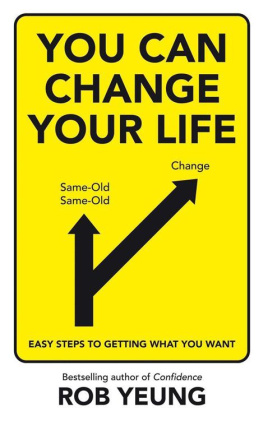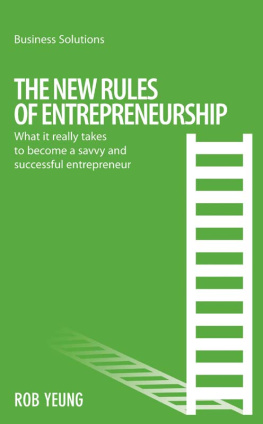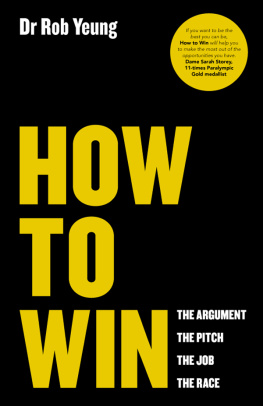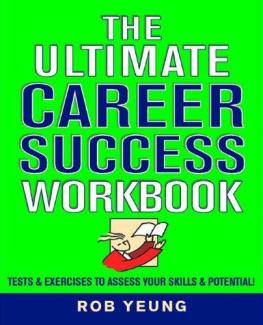Yeung - You can change your life: easy steps to getting what you want
Here you can read online Yeung - You can change your life: easy steps to getting what you want full text of the book (entire story) in english for free. Download pdf and epub, get meaning, cover and reviews about this ebook. City: London, year: 2012, publisher: Macmillan, genre: Romance novel. Description of the work, (preface) as well as reviews are available. Best literature library LitArk.com created for fans of good reading and offers a wide selection of genres:
Romance novel
Science fiction
Adventure
Detective
Science
History
Home and family
Prose
Art
Politics
Computer
Non-fiction
Religion
Business
Children
Humor
Choose a favorite category and find really read worthwhile books. Enjoy immersion in the world of imagination, feel the emotions of the characters or learn something new for yourself, make an fascinating discovery.
- Book:You can change your life: easy steps to getting what you want
- Author:
- Publisher:Macmillan
- Genre:
- Year:2012
- City:London
- Rating:3 / 5
- Favourites:Add to favourites
- Your mark:
- 60
- 1
- 2
- 3
- 4
- 5
You can change your life: easy steps to getting what you want: summary, description and annotation
We offer to read an annotation, description, summary or preface (depends on what the author of the book "You can change your life: easy steps to getting what you want" wrote himself). If you haven't found the necessary information about the book — write in the comments, we will try to find it.
Yeung: author's other books
Who wrote You can change your life: easy steps to getting what you want? Find out the surname, the name of the author of the book and a list of all author's works by series.
You can change your life: easy steps to getting what you want — read online for free the complete book (whole text) full work
Below is the text of the book, divided by pages. System saving the place of the last page read, allows you to conveniently read the book "You can change your life: easy steps to getting what you want" online for free, without having to search again every time where you left off. Put a bookmark, and you can go to the page where you finished reading at any time.
Font size:
Interval:
Bookmark:



Things do not change; we change.
Henry David Thoreau
Every year, millions of people try to change their lives. Many want to lose weight or get fitter. Some would like to improve their relationships with loved ones, quit bad habits or start healthy ones. Others are keen to change jobs, learn new skills or improve their financial situations. More than a few wish they could socialise more, become more self-confident or be happier. And the good news is: you can change your life.
A good friend of mine, whom Ill call Michael, keeps telling me how he wishes he could change his life. A man in his early forties, he runs a small business, a computer consultancy. Actually, he is the business both boss and sole employee. He travels the country running courses for people who need to get to grips with a specialist piece of financial software.
Sadly, he hates his job. He runs through the exact same training session day after day, answering more or less the same questions month after month. Hes away from home at least a couple of nights a week and ends up checking into one featureless, grey hotel after the next. He says its like being in a time warp or a really dull, financial accounting version of the movie Groundhog Day.
Michael hasnt been in a relationship for years either. Hes a lean man with thick dark hair, a square jaw and a generous smile who looks like he should be a sports coach or personal trainer. He could be a real catch for the right woman, but after a long week at work, the last thing he wants to do is to trawl bars and nightclubs. Neither does he feel obliged to try online dating.
Its just not me, he maintains.
For now, his dreams sustain him. In his fantasies, Michael sees himself running a thriving consultancy with perhaps a dozen people working for him internationally. He would sit at the head of this buzzing company, watching both plaudits and profits roll in. And then he might have the time to meet the right woman and live happily ever after.
Daydreaming about some distant horizon may actually make our goals less likely to come true
It was an evening several winters ago when he first mentioned his dream to me. Fuelled by more than a handful of late-night whiskies in a swanky bar, he spelt out how he wished his life could be.
Nothings changed yet. But its good to have a dream, right? It makes sense that having a positive picture of the future should keep us focused on our goals and inspired to achieve them.
Actually, no.
The thing is: daydreaming about some distant horizon may actually make our goals less likely to come true. And we know its true because theres proof.
Imagine for a moment that youve been asked by research psychologists to describe your daydreams, your wishes and fantasies about the future. The researchers ask you to write down what you hope for. Once youve recorded your thoughts, they thank you and that ends the experiment. Or so you think.
Two years later, the psychologists come back to see how youre getting on in life. They ask you how your career is going, what youre up to, and how much youre earning.
Thats exactly what psychologists at the University of Hamburg did. They asked a group of final-year university students about the positive thoughts, images or fantasies they had about leaving university and making a successful transition into the world of work.
Not all of the undergraduates had positive fantasies. But those who did were asked to describe their career-related dreams and fantasies by writing them down. Some dreamed about having lavish offices and good-looking colleagues working for them. Others contemplated big salaries and the possessions they could buy with their newfound wealth. They were also asked to rate how frequently they experienced such thoughts and images on a 10-point scale (where 1 = very rarely to 10 = very often).
Fast-forward two years to when the psychologists sent out a follow-up survey to find out how the (now) graduates were doing in their careers. Had they progressed in line with their dreams? Startlingly, individuals who had frequently dreamed about a bright future while still at university were earning less money than those who reported fewer positive fantasies. The daydreamers also reported having sent out fewer job applications and been offered fewer jobs proof perhaps that they had put less effort into their job-hunting than those who were more grounded in reality.
In other words, the more frequently a student had experienced positive fantasies about their future careers, the less successful they became. Rather than serving to inspire and galvanise them into action, their fantasies and wishes for good things had sapped their energy. It made them less likely to take charge, less likely to succeed.
If you want to understand the real principles that help people to achieve change, youre in the right place
The implications for my friend Michael arent terribly good then. The research tells us that the more he fixates on the best-case scenario of what he might achieve, the less likely he is to achieve it.
Unfortunately, Michael isnt alone.
Many books recommend that readers bring to mind vivid pictures of the lives that they want to achieve. The authors of such books say that painting a clear image of the future will help us to realise it. Regrettably, research tells us that those authors are wrong.
If you want to understand the real principles that help people to change their lives and discover the myths that are often perpetuated about change youre in the right place.
THE SCIENCE OF CHANGE AND PERSONAL IMPROVEMENT
As a psychologist, my job is to help people change their lives. Some have specific goals: they want a new job or want to feel more confident when socialising and dating, for example. Others have broader goals, such as wanting to understand why theyre not content they often wish to overhaul their lives and become happier.
When I counsel people on changing their circumstances, I aim to suggest only tools and techniques that work ones that are backed by scientific evidence. After all, if you went to see a doctor at a hospital about a pain in your chest, youd want to know that his advice was based on research, on proven strategies and treatments that would get rid of the pain as effectively as possible. You wouldnt go to a self-taught quack who simply has some personal experience of having got rid of his own chest pain or, worse yet, a charlatan who advocates chanting and wishful thinking in the belief it might help.
I aim to suggest only tools and techniques that work ones that are backed by scientific evidence
As a consequence, Im very wary of most so-called self-help books. Many self-help gurus are well intentioned but misguided. They too often base their recommendations on their own experience, on their personal theories about what will or wont help people to change. But without quantifiable evidence that their techniques work, their advice might be ineffective or even woefully harmful.
Fortunately, researchers all over the world from medical specialists and psychologists to neuroscientists and economists are constantly conducting studies on what does help folks to change. Theyre finding out what might inadvertently block us from making change successfully too.
Next pageFont size:
Interval:
Bookmark:
Similar books «You can change your life: easy steps to getting what you want»
Look at similar books to You can change your life: easy steps to getting what you want. We have selected literature similar in name and meaning in the hope of providing readers with more options to find new, interesting, not yet read works.
Discussion, reviews of the book You can change your life: easy steps to getting what you want and just readers' own opinions. Leave your comments, write what you think about the work, its meaning or the main characters. Specify what exactly you liked and what you didn't like, and why you think so.












